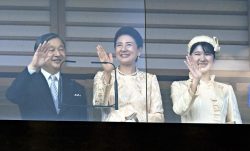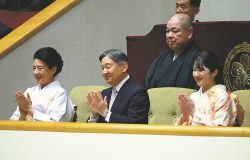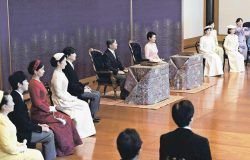In support of the Emperor: The roles and responsibilities of the female members of Japan’s Imperial family
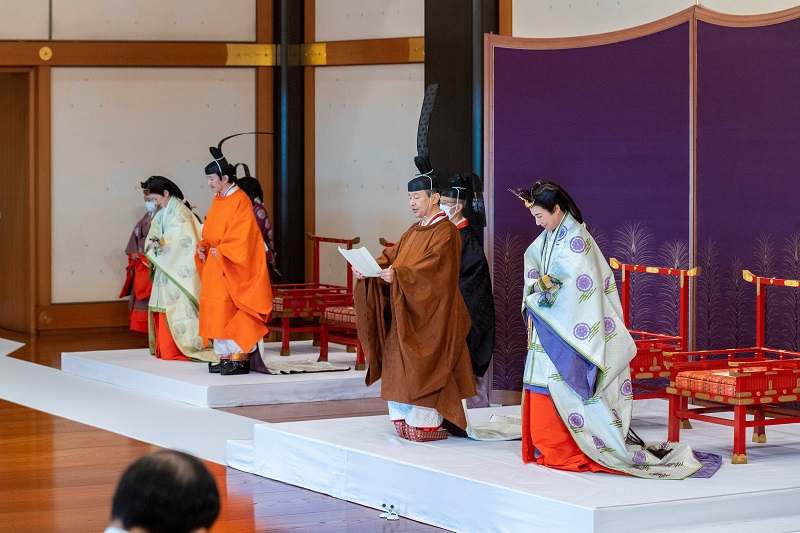
Japan’s Crown Prince Akishino (in orange robe), flanked by Crown Princess Kiko, attend a ceremony for formally proclaims Crown Prince Akishino is the first in line as heir to the throne, with Emperor Naruhito (2nd R), Empress Masako (R) and other royal family members and officials, at the Imperial Palace in Tokyo, Japan, November 8, 2020, in this handout photo provided by the Imperial Household Agency of Japan.
19:19 JST, October 26, 2021
Princess Mako, the eldest daughter of Crown Prince Akishino and Crown Princess Kiko, married on Tuesday and left the Imperial family.
On this occasion, The Yomiuri Shimbun has examined the activities and roles played by female members of the Imperial family in support of the Emperor, and how their lives change if they leave the Imperial family.
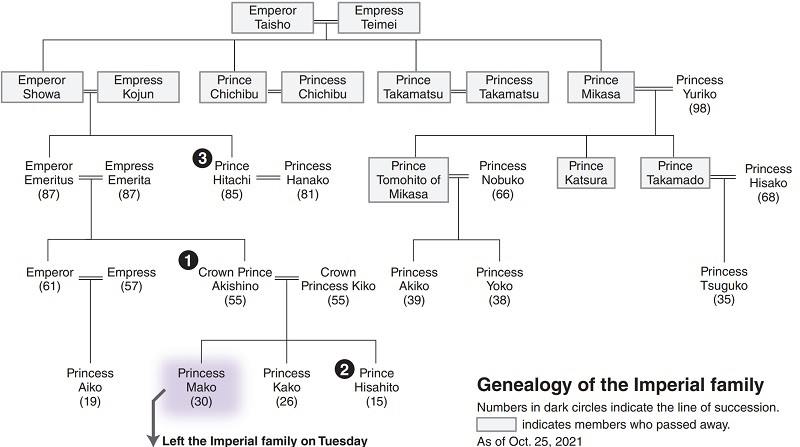
Genealogy of the Imperial family Numbers in dark circles indicate the line of succession. As of Oct. 25, 2021
Responsibilities
There are currently 13 female members of the Imperial family.
Seven of them, including the Empress and the Empress Emerita, entered the Imperial family through marriage, while the remaining six were born into the family, including Princess Aiko and Princess Kako.
Women born into the Imperial family have different titles depending on the degree of their relationship to an emperor. A daughter or granddaughter of an emperor is called a “naishinno” princess, while great-granddaughters and those further down the family line are “joo” princesses.
The main role of female members of the Imperial family is to support the activities of the Emperor. They play roles in Imperial family events from the age of 20. In addition to participating in traditional events at the Imperial Palace, such as the utakai hajime poetry ceremony during the New Year season and rituals praying to deities for the happiness of the people, they don magnificent dresses and tiaras to socialize with attendees at banquets for state guests.
With the number of male members of the Imperial family decreasing, the women have also taken on a wider range of Imperial activities.
Mako served as the honorary president of the Japan Tennis Association and president of the Japan Kogei Association. She took over these responsibilities from Crown Prince Akishino and Prince Katsura. The latter passed away in 2014.
Promoting international friendship is also an important duty for female Imperial members. In 2018, Mako made an official visit to Brazil that marked the 110th anniversary of Japanese people’s immigration to that country, and she officially visited Peru and Bolivia in 2019.
She has fulfilled her role as the eldest daughter of Crown Prince Akishino, who carries the title of koshi as the first in line to the Imperial throne.
Article 12 of the Imperial House Law stipulates that women will leave the Imperial family if they marry outside it. Under this article, Mako became a private citizen on Tuesday when the notice of her marriage was submitted to a local government office.

Documents that female Imperial family members can obtain after becoming commoners
Daily life expenses for Imperial family members are covered by the government. The allowances for the everyday expenses of the Emperor and Empress and their daughter Princess Aiko, plus the Emperor Emeritus and Empress Emerita, are called “naiteihi” (expenses for inner court members), while the allowances for other Imperial family members are called “kozokuhi” (expenses for Imperial family members). The amounts are set under the Imperial House Economy Law. Once they are paid, the allowances, called “otemotokin,” can be used freely.
The total naiteihi budget is ¥324 million a year, and about a third of the money is used for private court rituals.
The kozokuhi allowance is calculated in units of ¥30.5 million per person annually, and the amount varies depending on the position of the Imperial family member. For example, the kozokuhi is ¥91.5 million, three times the basic amount, for Crown Prince Akishino, who is first in line to the throne.
The head of an Imperial family branch is paid ¥30.5 million and each adult shinno prince and naishinno princess who do not have independent functions receive 30% of the fixed amount.
Naishinno Princess Mako received ¥3.05 million a year when she was a minor and ¥9.15 million a year after she reached adulthood.
The Imperial family allowances are paid twice a year, in April and October, for each family branch, and it is up to each branch to decide how to distribute the money.
A lump-sum allowance, paid when a woman loses her status as an Imperial family member upon marriage, is calculated based on kozokuhi. The amount of the allowance paid to a naishinno princess, who is either a daughter or a granddaughter of an emperor, is up to ¥152.5 million. A joo princess, who is a great-granddaughter or further descendant of an emperor, will be paid up to ¥106.75 million, seven-tenths of the amount paid to a naishinno princess.
The Imperial Household Economic Council normally decides the amount of the lump-sum payment based on the upper limit, but the Imperial Household Agency decided not to pay the allowance to Princess Mako, in keeping with her wishes.
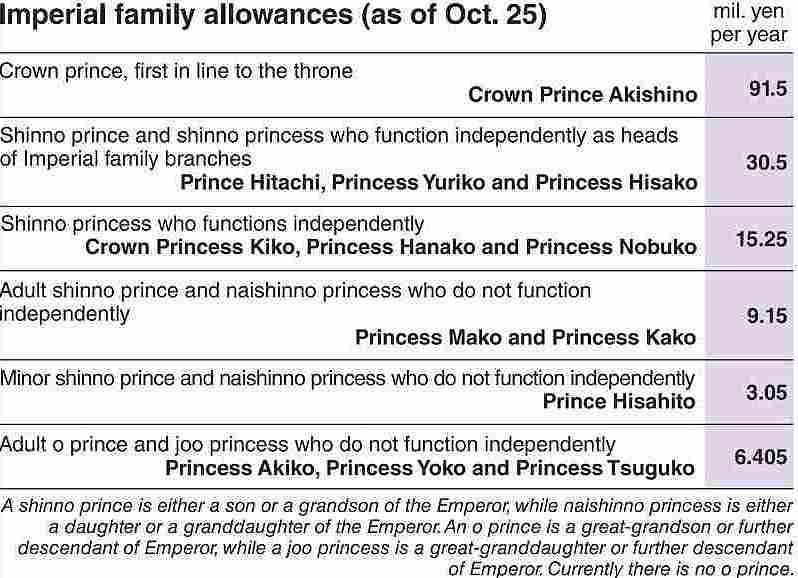
Imperial family allowances (as of Oct. 25)
Declining number of members
Princess Mako’s marriage brings the number of unmarried female Imperial family members down from six to five, and the total number of Imperial family members down from 18 to 17.
Under the current situation, Prince Hisahito, 15, is the only next-generation member eligible to succeed to the throne. Therefore, securing a sufficient number of Imperial family members is an urgent task.
The government’s expert panel on the issue compiled its interim report in July this year with two measures as pillars. One option is that naishinno princesses and joo princesses will maintain their status as Imperial household members even after marrying. The other option is that Imperial family members will be allowed to adopt children so that males from all-male Imperial blood lines will be made Imperial household members.
The first plan would create Imperial family branches led by female members. People who place importance on Imperial succession only by males on the male line have voiced concern that this plan could result in female emperors or emperors from female lines in the future.
The second option eyes a scenario in which male descendants from all-male lines in 11 Imperial family branches that were removed from the Imperial family record after World War II will be adopted by current Imperial family members so that they will become Imperial household members again.
The expert panel is continuing its research and studies about the two options.
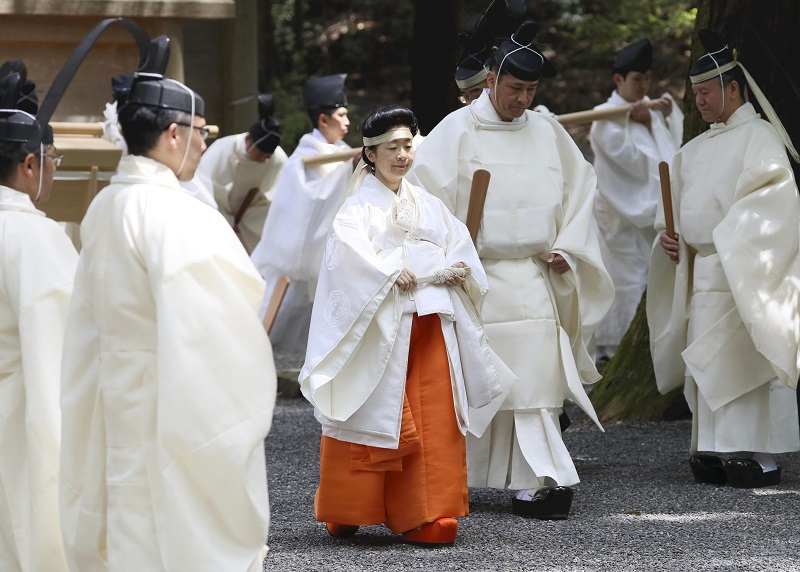
Sayako Kuroda, center, the younger sister of the Emperor, conducts a ritual related to her brother’s succession as the chief priestess of Ise Jingu shrine in Ise, Mie Prefecture, in May 2019.
Top Articles in Society
-

Producer Behind Pop Group XG Arrested for Cocaine Possession
-

Man Infected with Measles Reportedly Dined at Restaurant in Tokyo Station
-

Man Infected with Measles May Have Come in Contact with Many People in Tokyo, Went to Store, Restaurant Around When Symptoms Emerged
-

Woman with Measles Visited Hospital in Tokyo Multiple Times Before Being Diagnosed with Disease
-

Australian Woman Dies After Mishap on Ski Lift in Nagano Prefecture
JN ACCESS RANKING
-

Producer Behind Pop Group XG Arrested for Cocaine Possession
-

Japan PM Takaichi’s Cabinet Resigns en Masse
-

Man Infected with Measles Reportedly Dined at Restaurant in Tokyo Station
-

Israeli Ambassador to Japan Speaks about Japan’s Role in the Reconstruction of Gaza
-

Videos Plagiarized, Reposted with False Subtitles Claiming ‘Ryukyu Belongs to China’; Anti-China False Information Also Posted in Japan


